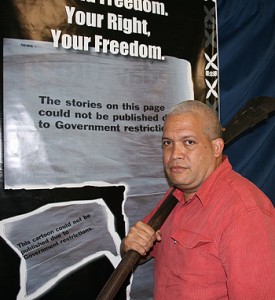Fiji Removes Censors While Restricting Media Freedom
by Brody Engelhard / February 1, 2012 / 1 Comment
Commodore and current Prime Minister of Fiji, Frank Bainimarama, took control of the country in a military coup in 2006. In 2009 he abolished the Constitution, placed censors in the media, and claimed no elections would take place until 2014.
This January marks the month that, according to Bainimarama, censors are supposed to be removed from the media’s newsrooms. While this seems like a positive development, several news outlets in New Zealand and Australia, such as Radio New Zealand, report that the right to freedom of speech and freedom of expression is still in peril in the island country of approximately 900,000.
In 2012, Fiji advanced 32 places on the Reporters Without Borders Press Freedom Index from its position at 149 in 2010. It currently ranks 117 out of 178 but is tied with both Zimbabwe and Venezuela, countries whose track records with censorship, media fines, and surveillance keep them low on the list. A state of emergency has also been in effect in Fiji since 2009 when Bainimarama’s government abolished the constitution. The censors and the state of emergency end this January, according to Bainimarama.
Under the state of emergency the government has passed several decrees, including Decree 29: The Media Industry Development Decree (pdf). This decree enforces strict punishments for journalists and publications that the government deems “irresponsible” and for stories considered capable of “incitement.” The Media Decree also creates a Media Authority in Fiji to preside over the press.
According to the regime’s Chief Censor Sharon Smith-Johns, “Once the state of emergency is lifted, [the Media Authority] will continue to ensure the media is balanced and accountable in their reporting.” The Media Authority can demand information and documents from journalists, issue fines up to $100,000, and even jail journalists for up to 5 years.
An interview with President of Fiji, Frank Bainimarama and Graham Davis of UK Sky News
With the unrelated deaths of four foreigners in Fiji being reportedly censored by the government in 2011, it might be more than just incitement and irresponsible journalism being censored. It could be Fiji’s global image that the censors have hoped to control. In the case of the deaths of foreigners- it has been speculated that media outlets were censored in order to maintain a safe image for tourists, a large part of the Fijian economy. One anti-government blog, Coup Four And A Half, claims that several tourist deaths were censored by the government “for fear of spooking tourists”.






One Comment on "Fiji Removes Censors While Restricting Media Freedom"
Trackbacks for this post